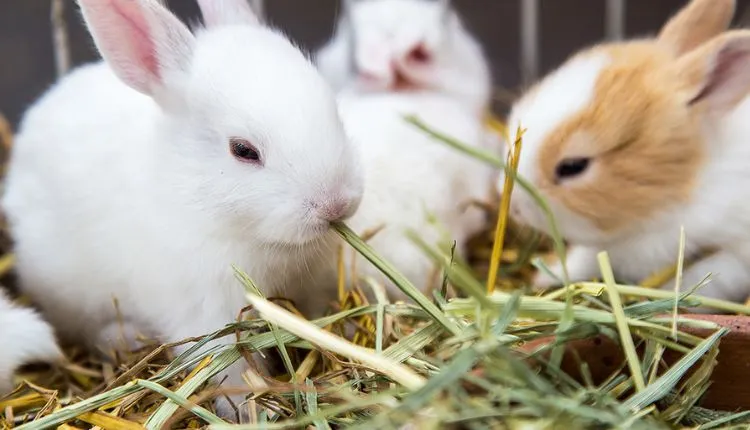As with any pet, rabbits need good food, exercise, and companionship. If these are not met, they may become overweight or ill, leading to health problems such as myxomatosis and rabbit hemorrhagic disease.
Rabbits should be vaccinated against RHD and VHD to reduce the risk of these diseases. They also require regular veterinary check-ups.
Hay
Hay is one of the most important foods for rabbits to eat. It provides essential on what do wild rabbits eat and helps to keep their teeth in check.
Hay can be purchased fresh or kiln-dried. The type of hay you choose depends on your bunny’s needs and your rabbit’s preferences.
Timothy hay is one of the most popular types of grass for pet rabbits. It has long soft stems and is green with a sweet smell.
Orchard grass hay is also an excellent choice for your rabbit’s diet. It has a sweet taste and is softer than other grasses, making it easier to chew.
Alfalfa hay is a type of grass hay that is high in protein and can be fed to young rabbits or as a treat for underweight rabbits.
There is also a range of mixed hay bags available for smaller animals, including different types of hay, such as oat hay. These can be an excellent alternative to timothy hay for some rabbits.
Vegetables
Vegetables are a nutritious part of the rabbit diet. However, they must be introduced slowly and gradually to avoid digestive problems like diarrhea or GI stasis.
Vegetables can be eaten raw or cooked and are a great way to provide your bunny with healthy nutrients they might not otherwise get in their hay and pelleted diet. They also offer a good source of water which helps keep your rabbit’s intestines hydrated and maintain their digestion correctly.
The leafy parts of vegetables are the safest and best for rabbits to eat as they contain high levels of fiber and other beneficial vitamins and nutrients. The stems and stalks of some vegetables are also nutritious for your bunny to eat in small amounts, but these should make up a smaller proportion of your rabbit’s diet as they are generally higher in starch and sugar than the leaves.
Nuggets or Pellets
The best way to keep our rabbits healthy is to provide them with a balanced diet. This means a mixture of pellets, hay, and fresh greens.
Nuggets are great for providing this because they’re delicious and full of natural goodness. They are also a great source of long fiber, which helps to keep your rabbit’s gut moving correctly.
They should be given in a carefully measured portion daily as part of a balanced diet and with a regular hay and leafy greens supply. It would be best if you rationed your rabbit’s nuggets based on their weight, age, activity levels, and other health issues.
Some muesli-style foods can harm rabbits as they are high in oats and other grains, which are likely to cause cecal dysbiosis. They can also be high in refined sugars, which can cause dental problems and obesity.
Green Foods
Fresh vegetables are a good source of nutrients that your rabbit’s hay and pellets may not provide. So introduce leafy greens slowly and carefully, one at a time, to your bunny’s diet.
Always choose organic produce. Vegetables often ship with pesticides, which can hazard your rabbit. Rinse your vegetables in cool water over a colander before serving them to your pet.
Avoid feeding carrot tops and celery leaves if your rabbit has a sensitive stomach or digestive system. These can cause digestive problems such as gas, diarrhea, and bloating.
Conversely, Cilantro is safe for bunnies and can be a good source of vitamins A, C, B6, thiamin, folate, calcium, and potassium.
Various other greens, such as kale and spinach, are also safe for rabbits. However, keep the calcium content of these foods to a minimum, as excessive amounts can cause urinary tract issues and kidney stones in rabbits.
